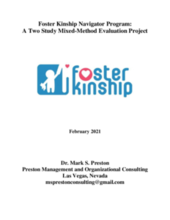Displaying 211 - 220 of 2221
This qualitative evaluation was to determine the level of fidelity of Clark County Nevada’s Foster Kinship navigator program to its navigator program manual and to ascertain if Foster Kinship’s navigator program for formal kinship families met the minimum standard for promising practice.
The author of this article analyzes young people’s experiences in foster care from a life course perspective, accounting for when foster care happens, how long it lasts, and what happens when foster care placements end.
The aim of this study was to examine whether 1) attachment to the biological parents mediates the association between abuse and suicidal risk (SR) and 2) attachment to a foster parent (whether from a foster home or an institution) moderates the effect of attachment to biological parents on SR.
This webinar, the fourth in the Shriver Center's Spotlight on the Foster System series, focused on intersections between the healthcare and foster systems.
Through the lens of the ecological systems model, the researchers sought to understand the internal and external factors that former foster youth believe have contributed to or impeded their choices to attend and ability to navigate college.
This study provides an exploration of foster child stress and behavioral health during and after Hurricane Irma.
This paper introduces the Charter of Lifelong Rights in Childhood Recordkeeping in Out-of-Home Care, centred on the critical, lifelong and diverse information and recordkeeping needs of Australian and Indigenous Australian children and adults who are experiencing, or have experienced Out-of-Home Care.
This study examines service users' and practitioners' assessment of the feasibility of systematically evaluated interventions in the everyday life of foster care families.
The authors of this study examined caregivers’ mind-mindedness (their ability to adequately interpret their foster child’s internal mental states and behavior) in out-of-home care in the Netherlands, and the association among caregivers’ mind-mindedness (and its positive, neutral, and negative valence), recognition of the child’s trauma symptoms, and behavior problems.
The authors of this study used two independent methods to estimate prevalence of sex trafficking victimization among with prior maltreatment and foster care placements in one state in the U.S.

